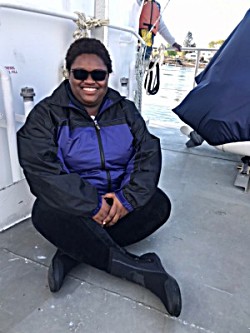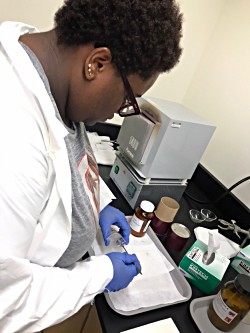
Note University of Maryland Eastern Shore student Rhyan Knight received an honorable mention for her presentation at the University of New Hampshire’s Undergraduate Research Conference Interdisciplinary Science & Engineering Symposium last month.
The annual conference was held virtually this year due to the global coronavirus pandemic. Knight, who is a NOAA Educational Partnership Program Living Marine Resources Cooperative Science Center Scholar, presented a pre-recorded talk on her poster titled, “Mercury Accumulation in the Great Bay Ecosystem – Links with Carbon and Sediment Size.”
“The research I conducted found that certain areas of the bay had elevated mercury and carbon content,” Knight said. “I tested two samples from different areas of the bay. One sample had a relatively low mercury concentration, while the other sample contained high mercury and carbon levels.”
The scholar was invited to present at the symposium as a result of her participation in the university’s Closes-GAP internship program last spring. The environmental science major spent four weeks on the campus of the University of New Hampshire to conduct research in the Great Bay. Although her time there was brief, her findings had an impact on the university long after she left, said her advisor Dr. Maurice Crawford, an associate professor in UMES’ Department of Natural Sciences. Due to her discoveries, he said, others have begun to look into the causes of the high mercury concentration, which could adversely affect the local oyster bays in the Great Bay.

“I think it was very valuable to gain experience not only in the field, but also in giving scientific talks and presentations,” Knight said.
###
Tanesha Hankerson, communications and outreach specialist, Department of Natural Sciences, 410-651-6196, tmhankerson@umes.edu.
See and hear her presentation here> https://media-gallery.unh.edu/media_submission/286/
This research was conducted under the following grant, led by Dr. Ruth Varner at the University of New Hampshire: Collaborative Links to Ocean Science and Earth Science Graduate Academic Programs (CLOSES-GAP). The grant is funded by the National Science Foundation.

